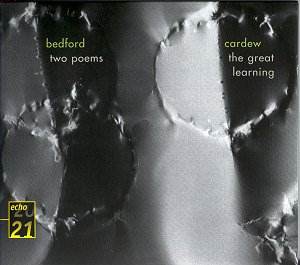The Echo 20/21 series has provided DG with the excuse
to reissue tapes of avant-garderie from the 1960s and 1970s. This was
the territory evangelically explored at the London Roundhouse and which,
at the time, alienated a generation and narrowed the enthusiast base
for classical music. The melodic-romantic tradition so battered by the
Glock-Schoenberg group has, since the mid-1970s, swept back into the
ascendancy. We can look back on it now from the vantage point of a much
more catholic, inclusive and liberally stocked market. In fact neither
the melodic hegemony nor the avant-garde elders have made much of an
impression on the concert hall!
Cardew established the Scratch Orchestra from professionals
and amateurs and their families. Its ranks included Cardew himself,
John Tilbury, Howard Skempton and Gavin Bryars.
The Great Learning is one of the four
classics of Confucianism. The first chapter is said to have been written
by Confucius himself. It is in seven 'Paragraphs' and these supply the
structure for a heptameron of which only two elements are represented
here. Paragraphs 2 and 7 in their entirety each last an hour. This disc
offers about a third of each work.
The Second Paragraph is a rapid, rhythmic piece
in which Ligetian vocal chatter reacts with the ragged raging ostinato
of African tomtom-style drums. That chattering vocal effect is prefigured
in Holst's Hymn of Jesus and even earlier in Tallis's 40-part
Spem in Alium. As the voices gradually fall away the rhythmic
drumming becomes less ragged and more sharply focused. The Seventh
Paragraph is a study in vocalism and bell decay harmonics - a deconstructed
Full Fathom Five from RVW's three Shakespeare settings. It has
a steady liturgical swell and swing.
Bedford sets two love poems by American poet Kenneth
Patchen: O now the drenched land wakes and The great birds.
The words are printed in the booklet. These two pieces are quite
brief. Equatorially luxuriant with detail and episode by comparison
with the Cardew, the singing resembles the same composer's Star Clusters,
Nebulae and Places in Devon; melodic yet with an openness to using
the entire palette of vocal effects.
The Hamburg Bedford recording sounds very clear. Perhaps
it is the nature of the music. The Cardew has a more distanced remote
spatial concert-hall quality. No attempt was made, back in those bosky
days, to make of this the sort of drums-spectacular we get in the Shchedrin
Carmen ballet.
Of the two composers' works I prefer the Cardew especially
Paragraph Seven which shows contemplative minimalist sympathies
close to those of two of Cardew’s teachers: Cage and Stockhausen. Desperately
unfashionable voices now; perhaps the axis of the musical world will
move again. Whether it will ever move far enough to deliver a complete
Cardew Paragraph or the whole of The Great Learning remains
to be seen.
Rob Barnett
